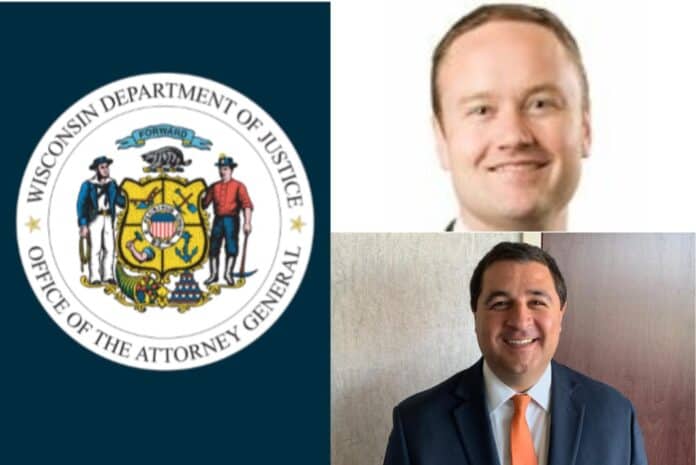A prosecutor who works for Democratic Attorney General Josh Kaul on election laws told the Wisconsin Election Commission in a lengthy memo last year that the so-called “fake electors” here did not violate state laws.
“The allegations in the Complaint, and the supporting arguments and evidence, do not indicate that the Respondents violated Wis. Stats. §§ 5.10 or 7.75,” the assistant attorney general, Mike Murphy, wrote. As a result of Murphy’s memo, the bipartisan Wisconsin Election Commission declined to sanction the alternate electors.

In the memo, Murphy also noted that there was historical precedent for alternate electors to meet, that the Wisconsin alternate electors believed they were meeting to preserve President Donald Trump’s legal rights IN CASE he prevailed in court, that litigation was ongoing in Wisconsin, that the electors were not secret, and that “federal law and Supreme Court commentary contemplate the possibility of multiple slates of electors.”
“Wisconsin law does not prohibit an alternative set of electors from meeting,” the assistant attorney general wrote.
Murphy’s memo significantly undercuts the arguments of Democratic partisans, including Gov. Tony Evers, who have called for prosecution or accountability for the 10 electors, who, in many cases, are average folks, some elderly, who volunteer for county parties. Evers is even using the issue in a campaign solicitation. Kaul has not announced his intentions; he can investigate them but not prosecute them, as that power is vested with local district attorneys in the counties where they reside (although DAs could name Kaul a special prosecutor to give him that power back, six live in Republican counties).
Milwaukee County DA John Chisholm’s office previously passed on investigating alternate electors here, saying the matter was better reviewed by Kaul’s office or federal authorities. Evers and Democratic partisans are resurrecting the issue in the wake of out-of-state indictments by Jack Smith and Fani Willis that mention the Wisconsin electors. However, Smith’s indictment says fake electors were “tricked” and thought their votes were only being cast to preserve Trump’s rights IN CASE he won in court.
The Murphy memo was first revealed by WISN-1130 AM talk show host Dan O’Donnell in an article for the MacIver Institute.
Wisconsin Assistant Attorney General Mike Murphy, described by O’Donnell as “a Democrat serving as outside counsel for the Elections Commission,” authored it. It is dated February 9, 2022.
Murphy’s LinkedIn page says he has worked for the state Attorney General’s office for more than 9 years. It reads,
Notable litigation matters include: Represent the Governor, Wisconsin Elections Commission, and other state agencies in presidential recount litigation and other election challenges; Represent Wisconsin Department of Transportation in a complex construction dispute; Represent the university system in financial and public records dispute.
Read his full bio here; he also has extensive experience in private practice.
You can read the memo here.
The memo begins, “This matter involves an allegation that ten presidential elector nominees violated certain Wisconsin election laws when they met on December 14, 2020,
to vote as presidential electors for Donald Trump and Michael Pence.”
He concluded: “Based upon the text of the relevant statutes, and in light of the facts, historical precedent, and related federal authorities, this memorandum concludes that the
Complaint does not raise a reasonable suspicion that Respondents violated Wisconsin election law.” [our emphasis]
Murphy notes that the action occurred “while court challenges to the election result were pending.” He added, “Respondents argue that the meeting was necessary to avoid missing a statutory deadline while legal challenges were pending.”
According to Murphy: “Respondents point out that if they did not meet that day, they risked having no electoral votes that could possibly be counted if their legal challenges were successful and Trump were declared the successful candidate by legal process. Respondents’ concern is reasonable; courts have found that candidates’ delays can bar legal rights.”
In the memo, Murphy did note that his conclusions are limited to the two statutes raised against the alternate electors in the complaint filed with WEC, Wis. Stat. §§ 5.05 and 7.75, not other laws.
“Nothing in either statute prohibits or otherwise limits a party from meeting to cast electoral votes during a challenge to an election tabulation,” he wrote. “They say nothing about an alternative set of electors casting votes and do not expressly prohibit a slate of electors form casting votes to preserve their votes in case pending legal challenges prove successful.”
The memo notes that shortly before the electors met, their activity was noted in a footnote in a court filing made by the Trump campaign. It reads,
Following the recommended approach to situations involving court challenges in Presidential elections which are not resolved by the time the Presidential electors must cast their votes pursuant to Art. II, § 1, cl. 4, and 3 U.S.C. § 7 (this year, December 14), the Trump-Pence Campaign has requested its electors to sign and send to Washington on that date their votes, to ensure that their votes will count on January 6 if there is a later determination that they are the duly appointed electors for Wisconsin.
The memo also says:
“In a social media post, Respondent (Bill) Feehan (an alternate elector) indicated that the Trump and Pence electoral college votes were “[j]ust keeping our legal options open.” (Compl. Ex. H.) The Republican Party of Wisconsin, via Respondent (State GOP Chairman at the time Andrew) Hitt, stated: ‘While President Trump’s campaign continues to pursue legal options for Wisconsin, Republican electors met today in accordance with statutory guidelines to preserve our role in the electoral process with the final outcome still pending in the courts.'”
This proves that Evers spoke falsely when he told the Eau Claire Leader-Telegram that the Wisconsin alternate electors met in secret.
Murphy’s memo also notes historical precedent:
“In the 1960 presidential election between Nixon and Kennedy, Hawaii’s canvassing showed Nixon a winner by 141 votes and the governor issued a certificate of election to the Republican slate. The results were challenged in a lawsuit brought by Democratic voters, and a recount was commenced. The recount was not completed by the date that presidential electors voted, December 19, and both the Democrats and Republicans met and cast their votes for their respective candidates. The recount concluded on December 28, and two days later the court declared that Kennedy had won the election by 115 votes. Ultimately, three certificates of electoral college votes and the court’s judgment was submitted to Congress, and the votes were counted for Kennedy in light of the December 30 court ruling.”
He continued: “The Respondents actions here were similar to those of the Democratic presidential electors in Hawaii. They cast their votes, even though the canvass did not reflect a Trump victory, in order to preserve the opportunity for the votes to be counted if a court challenge found that Trump received the majority of votes.”
Furthermore, Murphy wrote:
“Although the Commission’s decision is confined to a state law inquiry, it is notable that federal law and Supreme Court commentary contemplate the possibility of multiple slates of electors. Federal statutes include procedures for Congress to follow ‘in such case of more than one return or paper purporting to be a return from a State’ (3 U.S.C. § 15), and deadlines for state courts to resolve election-related disputes. 3 U.S.C. § 5. In a case involving the 2000 presidential election, the Supreme Court noted, in a dissent, that these
rules ‘do not prohibit a State from counting what the majority concedes to be legal votes until a bona fide winner is determined. Indeed, in 1960, Hawaii appointed two slates of electors and Congress chose to count the one appointed on January 4, 1961, well after the Title 3 deadlines.’ Bush v. Gore, 531 U.S. 98, 127, 121 S. Ct. 525 (2000) (J. Stevens, dissenting). These authorities acknowledge the possibility that state procedures may result in multiple electoral votes being transmitted to the federal legislature.”





![Governor Caught Playing Politics with Brillion Residents’ Lives & Livelihood [COLUMN] ron tusler](https://www.wisconsinrightnow.com/wp-content/uploads/2025/07/MixCollage-15-Jul-2025-03-35-PM-9568-356x220.jpg)


![Protecting Portland: No Good Deed Goes Unpunished [REVIEW]](https://www.wisconsinrightnow.com/wp-content/uploads/2025/07/portland-356x220.jpg)























